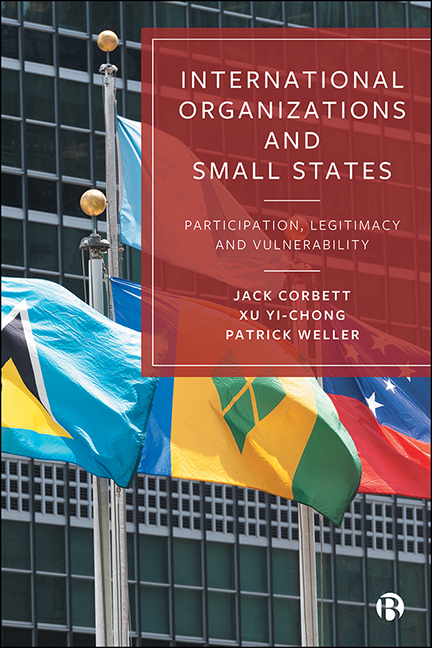2 - Why Do IOs Encourage the Participation of Small States?
Published online by Cambridge University Press: 13 May 2022
Summary
IOs are facing serious challenges in continuing their active role in managing collective problems, whether being climate change, migration, cybersecurity, pandemics, or economic and financial stability. Diagnoses range from: ‘the growing gap between yesterday's structures and today's problems’ (Goldin, 2013: 3); that the large, rich, and powerful states continue to use a combination of options – threat to exit, voice, and the creation of alternative institutions – to dominate the agenda (Morse and Keohane, 2014); the increasingly diverse number of members have caused constant gridlocks and impasses that paralyse decision making; that IOs have become ‘the Frankenstein problem’ themselves – that is, they develop preferences independent of the governments that created them, leading states to fight back by refusing to cooperate (Newman, 2010; Guzman, 2013); that a lack of popular elections and insulation of organizational leaders and bureaucrats creates a ‘democratic deficit’ (Koppell, 2008; Hurd, 2008); and the inability of IOs to manage the challenges stems from a lack of leadership, especially leadership of leading powers. All of these statements have some merit and capture aspects of the development of a complex IO world.
Our intervention starts with the straightforward point that the inclusion of the countries we now call SIDS in IOs has occurred against this backdrop. In the next chapter we show how SIDS sought to pursue their agenda in IOs. In this chapter we explain why IOs accommodated their involvement. We argue that the key reason they have created groupings like SIDS is that it contributes to their ongoing attempt to resolve these challenges, all of which threaten to undermine their legitimacy as authoritative global actors. To be effective IOs needed to be trusted by their member states to represent their interests. Without legitimacy, nothing will be achieved; legitimacy is a necessary condition for success but not a sufficient one. The significance of this research agenda derives from Buchanan and Keohane's (2006: 407) argument that ‘[t] he perception of legitimacy matters because, in a democratic era, multilateral institutions will only thrive if they are viewed legitimate by democratic publics’.
The legitimacy of IOs is the subject of intense academic debate (Agne et al, 2015; Gronau and Schmidtke, 2016; Lenz and Viola, 2017; Tallberg and Zürn 2019).
- Type
- Chapter
- Information
- International Organizations and Small StatesParticipation, Legitimacy and Vulnerability, pp. 29 - 57Publisher: Bristol University PressPrint publication year: 2021

